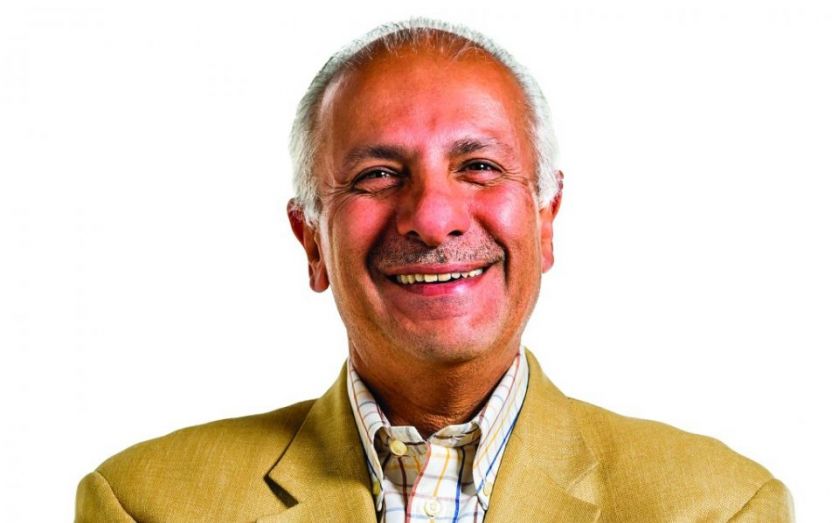From flights to philanthropy: Ebookers founder Dinesh Dhamija talks luck, Romania and why Britain’s entrepreneurs shouldn’t be too bothered about the General Election

We often hear that the startup landscape of today lacks funding opportunities: the banks still aren’t lending to small businesses, and despite pockets of cash existing, unless you’ve got the inside track, it’s difficult to know how to access them.
But Dinesh Dhamija, the multi-millionaire son of an Indian diplomat who, in 1999, founded online travel agency Ebookers, says the situation has actually never been that different. It was back in 1980 that he and his wife Tani began selling travel tickets from a kiosk at Earl’s Court Tube station.“She knew far more about travel because she’d been an air hostess – I could see the bigger picture. But it was a case of bootstrapping. You couldn’t get any money from banks and we had no parents or fairy godmother giving us a pile of capital.”
Dhamija is adamant that funding from a bank in any day and age isn’t the ideal way forward: “they’ll back you if you give them a security, but that’s just a licence to print money; it’s not entrepreneurship”. His views haven’t hurt him. Come 1983, the couple’s venture had become travel agency Flightbookers. By 1987, it was made general sales agent for four airlines in the UK and Ireland. A decade later, it had established offices across 12 countries.
ROUGH WITH THE SMOOTH
After morphing into Ebookers, the company was sold in 2005 for £247m, of which Dhamija received £100m. But he’s the first to admit that, riding the dotcom wave, the success the firm saw during the 1990s demonstrates something key about starting a business: “the real answer is that you need a lot of luck… Because of the internet, we were almost a monopoly – along with LastMinute.com, that is.”
And the company was lucky to make it into the 2000s. “We went through the huge growth that came with the internet, but also 9/11, the second Iraq war, the Sars virus and the Asian tsunami.” Unlike many businesses, Ebookers survived: “we went through it, and came out okay.” But Dame Fortune isn’t the be all and end all: “with golf, for instance, the harder I practise, the luckier I get.”
A CHANGE OF COURSE
Golf, as it happens, is actually more than a hobby (or source of aphorisms) for Dhamija. His Copper Beech resort (which offers an impressive golfing experience) is one of 18 businesses he owns in Romania, with a portfolio spanning ecotourism, education, agriculture and property. Ask “why Romania?,” and the answer captures Dhamija’s dogged logic and clarity: “it was 2007 and it was about to join the EU. The legal environment was stable, and investment was coming in.”
As a veteran entrepreneur, Dhamija is known now for the philanthropic work he does. One charity he helped found in India gives free medicines to New Delhi slum dwellers. In 2010, there were 10,000 registered patients.
To date, the former Scope adviser and current governor of the Rainbow foundation has given over £5m to charities and organisations in the UK and India. Giving, says Dhamija, “was a natural progression after I sold my business. Each to their own, but I believe it’s always a good thing to give back in one way or another”.
His latest project is his work as president of The Indus Entrepreneurs (TiE) – the world’s largest not-for-profit organisation that works to foster entrepreneurship. Founded by Indian technologists in Silicon Valley in 1992, it provides networking, mentoring, incubating and funding, predominantly to south Asian-origin entrepreneurs.
For Dhamija, heading up London’s offering provides an opportunity to “support Asians who have committed themselves to London and the UK. They’ve provided a lot of employment, but we just don’t hear about it”. He’s keen to open up TiE more to non-Asian entrepreneurs, too: “It’s easy for Asians to gravitate, but we offer any entrepreneur a lot.”
TROUBLE AHEAD?
But for those who have worked in both India and the UK, the advantages the latter offers are even clearer, says Dhamija. “The UK still has a disadvantage when you compare its ecosystem for entrepreneurs with that of the US – but it is much better than all other countries.”
Is he worried about the impending General Election? “It’s not uncertain at all. Essentially, it’ll be a coalition. We’ve got that now and it’s been okay.” Moreover, beyond the election, the outlook for entrepreneurs is overwhelmingly positive, says Dhamija – that’s provided the government doesn’t interfere too much, he chuckles.
DINESH DHAMIJA CV
Company name: Ebookers; now running the London chapter of The Indus Entrepreneurs (TiE)
Age: 65
Born: Canberra, Australia
Lives: Surrey
Studied: Cambridge University, Harvard Business School and IMD Lausanne
Drinking: A nice port
Eating: It really depends on the restaurants and the chefs – I like to try their specialities
Currently reading: I’m not at the moment
Favourite Business Book: I am a fan of Harvard Business Review
Talents: Vision, entrepreneurship, scaling businesses, mentoring, charity fundraising and online marketing
Heroes: Warren Buffett
First ambition: To make a lot of money
Motto: “Only the paranoid survive”
Most likely to say: Whenever there is a problem, I often tell people that it’s all in their mind – it’s not really a problem. I’m also known for saying that people should “be more in the present”.
Least likely to say: Give up
Awards: Entrepreneur of the Year (Management Today), Asian Man of the Year (GG2 Awards) and member of the British Travel Industry Hall of Fame